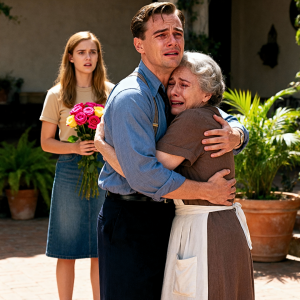
Leonardo Vargas had always been the kind of man who moved through life as though it were arranged in his favor. By thirty, he was already a successful tech entrepreneur in San Francisco, equally known for his million-dollar acquisitions and for never missing a gala. Charismatic, indulgent, and allergic to commitment, he considered marriage little more than an outdated performance.
At a dinner party one night, his oldest friend, Daniel, loosened by champagne, began boasting about his younger sister.
“She’s brilliant, responsible, devoted though not the type to turn heads. Men overlook her.”
Leonardo smirked. “Introduce her to me. Maybe I’ll finally settle down, and my mother will stop asking when I plan to grow up.”
Daniel laughed, thinking it was banter. But two days later he showed up with Isabel.
She wore a plain navy dress and her dark hair was pulled into a severe bun. No makeup, no flirting smile. She didn’t try to charm anyone, least of all Leonardo. Yet her steady gaze unsettled him—it was unwavering, quietly powerful, not the glance of someone hoping to please.
“So, Isabel,” he teased, “shall we get married?”
She looked at him without hesitation. “If you like. But don’t mistake me for a joke.”
Within a week, papers were signed, rings exchanged, and Leonardo found himself married almost by accident.

He expected a compliant partner, a shadow who would orbit his glittering life. What he got was a woman who refused to play roles. Isabel did not fuss over his late nights, did not compete for his attention, did not trail after him. She woke early, worked long hours, and—without fanfare—began building her own career in software engineering. Before long, her name appeared on panels, articles, and conference programs.
Leonardo, who had never imagined his wife as an equal, found himself fascinated. Irritated at first, then curious, and finally—against his own will—captivated. But by the time he realized he was in love, Isabel had already decided their story would not be his to direct.
When he confessed, “I want this marriage to be real,” she only smiled faintly. “I warned you, Leonardo. I’m not a prop in your performance.”
Three months after the wedding, she packed her belongings and moved into a small apartment downtown. No arguments, no scenes. “We married on a whim. I live seriously,” she said, closing the door.
For the first time, Leonardo—who had always believed everything was his for the taking—felt powerless. Flowers were returned, calls ignored, messages answered with polite finality. Meanwhile, Isabel’s platform grew, her presence in the tech world undeniable.
A year later, they were still legally married, though estranged. Then an invitation arrived for Isabel: a private summit of global investors, hosted by Leonardo himself. She hesitated, but curiosity drew her in.
Standing on stage, he addressed the room, yet his eyes locked only on her. “I’ve lost much, but I understand one thing: life without you is hollow. Not because my family insists, not for appearances. Simply because you are the only truth I have ever known.”
She did not soften. “Then file for divorce. If you return, let it be not as a man who jokes, but as one who has earned the right to stand beside me.”
The room erupted in applause. And to everyone’s astonishment, Leonardo did exactly as she asked. He withdrew from his endless parties, redirected his wealth into mentoring programs and nonprofit initiatives, and signed the divorce decree. Not to free himself, but to prove he could choose authenticity over spectacle.

Months later, Isabel received a letter: I am not asking for the past. Only for the chance to meet you again in the present. I will be here, quietly, if you decide.
She met him in a café. He looked older, less polished, but more genuine. She smiled—grateful, but firm. “I’m happy as I am. My path no longer runs beside yours.”
He nodded, without resentment. “Then may it be a bright path. And know I’ll always be proud that, once, you said yes.”
They parted. No fairy tale. Just reality.
Nearly a year later, another letter arrived, written in his unmistakable hand. He was leaving for East Africa, joining a long-term project installing solar panels and teaching children basic programming. This is not running away. It is my choice to matter. I loved you not for what you gave me, but for showing me who I could be. If you ever wish to see what I’ve become, come. I won’t wait, but I will hope.
She stared out the window, torn between freedom and the fear of vulnerability. The next morning, she booked a flight to Nairobi.
When she arrived, Leonardo was waiting—not with roses or expensive suits, but with sunburned skin and weary eyes softened by sincerity. He showed her villages, schools, clinics. No cameras, no audience. Only work, and meaning.
On the day of her departure, he didn’t beg her to stay. He simply said, “We’ve had a wedding, a divorce, distance, silence, and now this. The only thing we haven’t had is something simple—like sharing a cup of tea.”
For the first time, Isabel didn’t search for the trap. She just smiled. “Let’s.”
And that was how their real story began. Not as a fairy tale, but as life.




